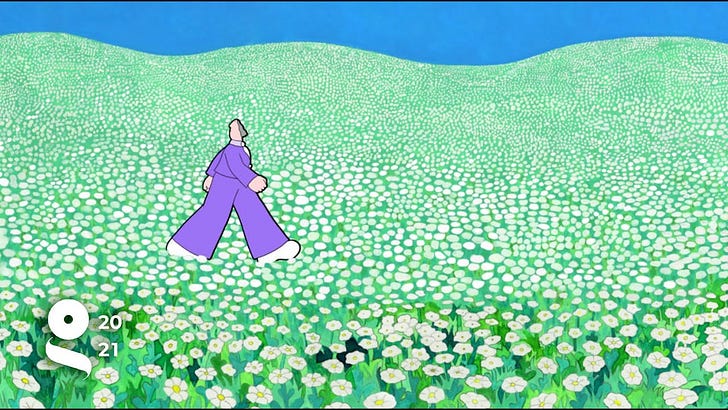In the acid-trip-surrealist-afterlife-short-form-animation AU REVOIR JÉRÔME ! , Jérôme seeks his dead wife through Paradise, jumping through daisy fields and barbecues and ballrooms all in an effort to find her. He has, presumably, killed himself to see her sooner. Upon finding her reading under a willow tree, her refusal to be with him duplicates the act, and he throws himself off a cliff and shatters on the desert floor.
What follows is trippy and indescribable, but basically involves ants putting Humpty Dumpty back together again. And then Jérôme is no longer many pieces but one piece, but still makes the sound of cracking porcelain whenever he walks.
What if we could sound our grief? Mari Andrews wrote about this in a recent newsletter, describing how grief can be expressed not so much words but sounds. A baby’s keening for its mother, the rough hitching of sobs in the brokenhearted’s chest. Our big footed hero’s ceramic footsteps allow his grief to be heard. He’s back together, yet irrevocably changed, every movement crackling with loss.
I’ve been journaling in Spanish recently, which is nice for my language recollection, excellent to avoid nosy eyes at coffee shops as I journal about the people around me, and good for the heart, to be trying something new. The way I express myself is, of course, different, with each language containing its own specific vocabulary and priorities.
For me, a junior Spanish student, it also changes the way I think. Because of the gaps in my knowledge, I have to think around words, the space in between the feeling I want to express and the words I have access to more tangible than in my native English. Because I’m more aware of my own failures to describe, those failures are no longer a frustration, but a feeling, where an open ended gesture at what I really mean is as satisfying as finding the perfect word. I am unafraid of being misunderstood because I myself know I don’t understand.
How much would this change if I could express myself in sounds? If language fell away, and all that remained were expressions of feelings in guttural moans? We could express ourselves absolute precision, but understand nothing at all because of it. Expression invites misunderstanding, and the more symbolic and sonar the less explicative and transferrable.
I have a tendency to over explain. To knead jokes out until the funniest parts are a mash of glutenous strands, too tight to expand. To assume that I will be taken at my worst, not granted the benefit of the doubt or good intent. Because how often, really, does anyone give a stranger the benefit of the doubt?
To resist this temptation in writing is to allow the spaces between the words to become more important. The magic ingredient is air, and so gasping for breath I’m trying to leave things a little more open

